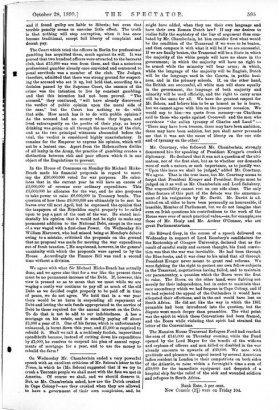On Wednesday Mr. Chamberlain ended a very powerful speech with
an excellent criticism of Mr. Selma's letter to the Times, in which he (Mr. Mons) suggested that if we try to crush a Teutonic people we shall meet with the fate we met in America. Of course we shall, and we should deserve it. But, as Mr. Chamberlain asked, how are the Dutch crushed in Cape Colony R—are they crushed when they are allowed to have a government of their own complexion, and, he might have added, when they use their own language and have their own Roman Dutch law? If any one desires to realise fully the sophistry of the line of argument thus com- bated by Mr. Chamberlain, let him consider first what would be the condition of the Transvaal if we were to be beaten, and then compare it with what it will be if we are successful. If we are finally beaten, the Transvaal will be a State in which the majority of the white people will have no share in the government; in which the majority will have no right to be armed while the minority will bear arms; in which, while the language of the majority will be English, Dutch will be the language used in the Courts, in public busi- ness, and in the primary schools. If, on the other hand, the British are successful, all white men will share equally in the government, the language of both majority and minority will be used officially, and the right to carry arms will be the same for all. We have the greatest respect for Mr. Mons, and believe him to be as honest as he is brave, but we cannot agree with him on the present occasion. We would say to him—we quote from memory—as Chatham said to those who spoke against Cromwell and the men who overthrew "the sullen tyranny of Charles and Laud"
There may have been treason, there may have been ambition, there may have been sedition, but you shall never persuade me that it was not the cause of liberty on the one side and of tyranny on the other.'






































 Previous page
Previous page